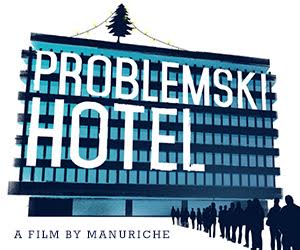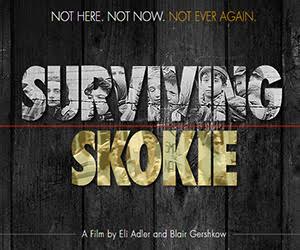
Watch the video interview on Youtube here
Film Courage: Elaine, do you remember the first time you heard about [the idea for] SPACE COMMAND [Movie]?
Elaine Zicree: Oh, my gosh!
Marc Zicree: [Laughs]
Elaine Zicree: Well…no I don’t. It seems to be ubiquitous.
Marc Zicree: …It’s the hell you wondered into [smiling].
Elaine Zicree: …He [Marc] has been talking about it forever, you know? But I actually don’t remember. When did you first hit me up with that [laughing]?
“Am I actually creating something which is making the world a better place? Am I actually sending out a message that I would want people to take to heart? You know TV can do one of three things: It can anesthetize or fill people with despair or inspire people. And I think the first obligation of any dramatic entertainment is to entertain, obviously. If you don’t entertain, it doesn’t matter what your message is. People won’t stick around for it.”

Marc Zicree: Hhmmm? Well you know it’s funny because with SPACE COMMAND it evolved over a period of time. Basically as I said Star Trek was really a formative moment in my life. When Star Trek debuted the first episode was The Man Trap. It aired…I think Star Trek debuted when I was 10 years old and it was the thing I had been waiting all my life for it. It really brought everything together. And I think from the moment that I read The Making of Star Trek when I was 13, I decided I wanted to be a show runner. I wanted to create and run my own science fiction show. And all the hundred of hours of television I did. All the books I wrote were all toward learning that, gaining those skills that I would need to be able to do that thing. And when Elaine and I got together…we’ve been together for 40 years. We’ve been married for 39 [years]. She was a terrific director. She’d already been a director for an off-broadway show. She’d already been an actress. She was a wonderful writer and so on some projects we would collaborate and on other projects we would work more individually over the years. But clearly with SPACE COMMAND it obvious that I would need her skill set. And we both love working with actors. We both love working with editors. I love visual effects artists. I love concept designers and so forth. So I had been gathering a team. So from the beginning I knew that I wanted to work with Elaine on this project.
Elaine Zicree: The key jumping off point was we were both feeling disturbed about the dark and cynical turn that science fiction had taken and he [Marc] introduced me…I guess I knew a little bit about it before, but he was a great fan of things like Space Patrol and it was where bad things happen but the good people were good people.
Marc Zicree: Well…just to jump in for a second, Space Patrol was a show that aired live in the 1950’s. And I didn’t grow up watching it but in the 1980’s USA Cable [Network] had a show called Night Flight and they ran kinescopes of that show. Kinescopes were filmed…basically you’d put a camera, a 16 mm camera on a high-resolution TV screen as the show was broadcast live and you would record it on film and that was called kinescopes. And so they would air those kinescopes of Space Patrol. It was a wonderful show. It came on before Star Trek. But it had a great sense of adventure and later I met the start of the show Ed Kemmer who had been a pilot in World War II. He flew a (North American Aviation) P-51 Mustang. He was captured by the Germans. Escaped from a German prisoner-of-war camp. He was a real hero before he played a science fiction hero in the 1950’s.

Watch the video on Youtube here
Elaine Zicree: And he looked like one. He seemed like one.
Marc Zicree: A very handsome man. And so that was part of the inspiration and then of course Star Trek. And what Elaine was talking about [regarding] the dark science fiction, there was a period a few years ago where all the science fiction was very dark and very dystopic, whether it was Battlestar Galactica which I very much liked or Elysium or After Earth or any of these things. They all were saying “The future is going to be really bad and there is not anything you can do about it.”
Elaine Zicree: And that most people are mean-spirited and things don’t work out. And what was odd and what Marc pointed out that was odd, these were written by writers whose lives were pretty darn good.
Marc Zicree: Yeah, they would go home to their families and they lived in Pacific Palisades. It was a very nice life. They were paid hundred of thousands of dollars or millions of dollars. So some how there was a disconnect from the life they were creating personally and the work they were writing. And I felt very strongly that science fiction, Outer Limits, Twilight Zone, Star Trek, those shows had a moral compass. And particularly Star Trek said “The future is going to have challenges.” Star Trek was shot during the civil rights movement, during the Vietnam War and yet said “The future is going to have challenges but we can reach across boundaries and barriers and come together to create something better.” And I thought that was very important to say now.

Check out Marc Scott Zicree’s THE TWILIGHT ZONE COMPANION here
Elaine Zicree: And some of it is not just about science fiction, it’s the objective of storytelling. I mean if we assume that most people have kind of a hard life, that somebody in their family is mentally ill, somebody is on substances. You struggle and you work hard and you watch a story and it says “Well things are really dark and awful and you don’t have any hope and things are going to go to hell.” And you say well is that really a responsible stand to take or do you want your audience to go out of there and say “Okay, it’s a struggle but people can come out on top. People are basically good at heart if you just give them a shot.” And you give people a sense when they leave that theater there is possibility. It just seems far more accurate and socially responsible then to just put them on a downer.
Marc Zicree: Well, you know, we’re working in an extremely powerful medium. Television reaches millions of people around the world. If you do it right, it lasts forever. Most of the shows I’ve written for are still being watched even the ones I wrote when I was in my early twenties. And so there is a question that many writers never ask themselves, which is (as far as I can tell)… which is “Am I actually creating something which is making the world a better place? Am I actually sending out a message that I would want people to take to heart?” You know TV can do one of three things: It can anesthetize or fill people with despair or inspire people. And I think the first obligation of any dramatic entertainment is to entertain, obviously. If you don’t entertain, it doesn’t matter what your message is. People won’t stick around for it. But beyond that, once you entertain people, once you bring them into your world and they love that world and want to be part of that world, then if you can say take these lessons, take what you’ve seen in this story, take it out into the real world, take it out into your life, you can actually have a better life. You can actually make a better world. I think those are very important messages to communicate.

Watch THE TABLE with the Zicrees
Elaine Zicree: Not airy-fairy. Not to sugar coat anything. Because people don’t like to be lied to. And they know when they’re being lied to like “Oh, everybody is happy and everybody is…” but within a real context where you say “Okay, things are hard, you get into a bad mood, you say the wrong thing but you can be man enough to apologize.” Those are the kind of things you’d like to address.
Question for the Viewers: Do you feel a responsibility to inspire with your writing/storytelling?
About Marc and Elaine:
Working both together and individually, writer-producer-directors Marc Scott Zicree and Elaine Zicree have sold over 100 teleplays, screenplays and pilots to every major studio and network, including landmark stories for such shows as STAR TREK– THE NEXT GENERATION, DEEP SPACE NINE, THE NEW TWILIGHT ZONE, BABYLON 5, BEAUTY AND THE BEAST, FOREVER KNIGHT, SLIDERS, LIBERTY’S KIDS, SUPERFRIENDS, HE-MAN, REAL GHOSTBUSTERS and SMURFS. Their work has been nominated for the American Book Award, Humanitas Prize, Diane Thomas Award, and Hugo and Nebula Awards, and they’ve won the TV Guide Award, prestigious Hamptons Prize and 2011 Rondo and Saturn Awards. Fans of their work include Steve Spielberg, J.J. Abrams, Ray Bradbury, Damon Lindelof, Frank Darabont, Joss Whedon and millions of fans around the world (Read more here).
CONNECT WITH MARC AND ELAINE
Supermentors.com
Twitter
Facebook.com/marc.zicree
CONNECT WITH SPACE COMMAND
Spacecommandmovie.com
Twitter
Facebook.com/spacecommandmovie
Advertisement

Visit LeftOnPurpose.com here to watch the film and read more on Mayer Vishner
LEFT ON PURPOSE – Midway through the filming of a documentary about his life as an anti war activist, Mayer Vishner declares that his time has passed and that his last political act will be to commit suicide— and he wants it all on camera. Now the director must decide whether to turn off his camera or use it to keep his friend alive. Left on Purpose is an award winning feature length documentary that confronts the growing issues of aging, isolation and end of life choices through an intense character driven story of the relationship between filmmaker and subject. With humor and heart it provides a rare cinematic look at what it means to be a friend to someone in pain.

Watch The Special Need on Vimeo here
THE SPECIAL NEED: Enea is 29. He has blue eyes, likes trucks, and loves girls. He hasn’t found the right one yet. Still he has never stopped looking for her. One more thing about Enea: he is autistic. One day, after taking a photo of a girl on the bus, he is pushed to the ground by her boyfriend. Enea’s therapist convinces his mom that the time has come for the man to cope with his sexual desires. Enea’s friends Carlo and Alex get involved and try to find a way for Enea to have sex in a safe and legal environment.

Watch Problemski Hotel on Vimeo here
PROBLEMSKI HOTEL: For the inmates of the multinational residential center somewhere in Europe, the circular, black comedy that is the cross-frontier migrant’s life ‘within the system’ becomes even blacker in December. For we are in the European ‘season of gladness and joy.’ Bipul doesn’t want to admit it to himself, but the Russian girl’s arrival makes a difference: Lidia. Hope? Surely not! A future? Get real! December is also the ninth month of Martina’s pregnancy. Pregnancies don’t go round in circles; they end in eruptions. Because when the situation is hopeless, rescue is near.

Watch Surviving Skokie on Vimeo here
SURVIVING SKOKIE: They survived the horrors of the Holocaust and came to America to put the past behind. For decades they kept their awful memories secret, even from their children. But their silence ended when a band of neo-Nazi thugs threatened to march in their quiet village of Skokie, Illinois “because that is where the Jews are.”
Surviving Skokie is an intensely personal documentary by former Skokie resident Eli Adler about the provocative events of the 1970s, their aftermath, his family’s horrific experience of the Shoah, and a journey with his father to confront long-suppressed memories.
























